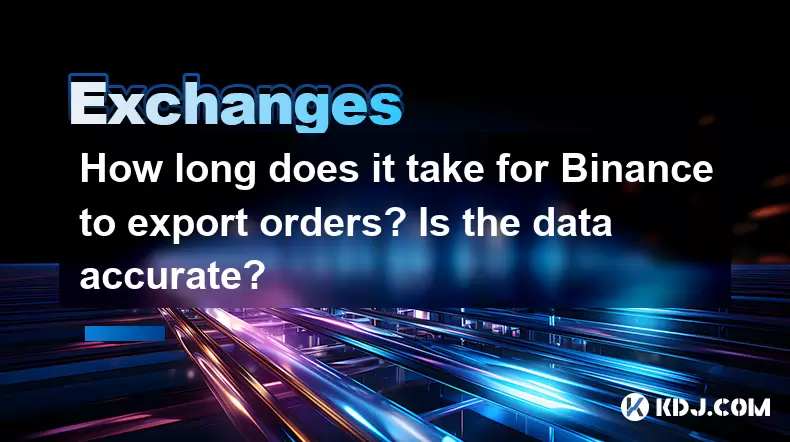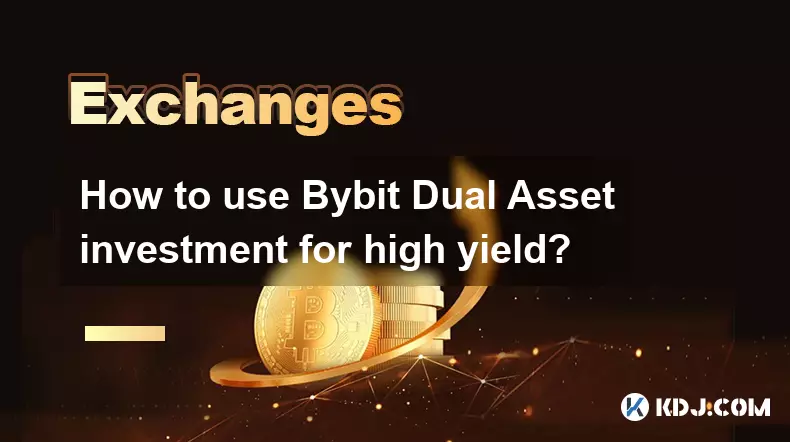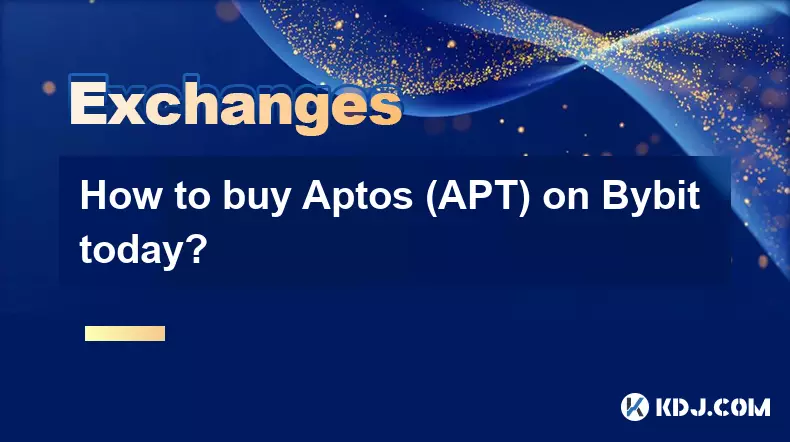-
 bitcoin
bitcoin $87959.907984 USD
1.34% -
 ethereum
ethereum $2920.497338 USD
3.04% -
 tether
tether $0.999775 USD
0.00% -
 xrp
xrp $2.237324 USD
8.12% -
 bnb
bnb $860.243768 USD
0.90% -
 solana
solana $138.089498 USD
5.43% -
 usd-coin
usd-coin $0.999807 USD
0.01% -
 tron
tron $0.272801 USD
-1.53% -
 dogecoin
dogecoin $0.150904 USD
2.96% -
 cardano
cardano $0.421635 USD
1.97% -
 hyperliquid
hyperliquid $32.152445 USD
2.23% -
 bitcoin-cash
bitcoin-cash $533.301069 USD
-1.94% -
 chainlink
chainlink $12.953417 USD
2.68% -
 unus-sed-leo
unus-sed-leo $9.535951 USD
0.73% -
 zcash
zcash $521.483386 USD
-2.87%
How long does it take for Binance to export orders? Is the data accurate?
Exporting orders from Binance can take minutes to hours, depending on data volume and server load; the data is generally accurate but should be verified.
May 19, 2025 at 01:50 pm

When it comes to exporting orders from Binance, many users are curious about the duration of the process and the accuracy of the data provided. Binance, one of the leading cryptocurrency exchanges, offers users the ability to export their trading history, which can be crucial for tax purposes, analysis, or simply keeping track of transactions. In this article, we will delve into the specifics of how long it typically takes for Binance to export orders and discuss the accuracy of the data provided.
Understanding Binance Order Exports
Binance provides a feature that allows users to export their trading history in the form of a CSV file. This feature is accessible through the Binance platform, and it includes a variety of data points such as the date, time, pair, type, side, price, amount, and fees associated with each trade. Understanding the specifics of what data is included can help users better appreciate the utility of the export feature.
The Process of Exporting Orders
To export orders from Binance, users need to follow a few straightforward steps. Here’s how you can do it:
- Log into your Binance account.
- Navigate to the 'Orders' section on the Binance website or app.
- Select the 'Export' option. You may have to choose the time range for which you want to export the data.
- Confirm the export. Binance will then generate a CSV file containing your trading history.
The process itself is relatively quick, but the actual time it takes for Binance to prepare and make the CSV file available can vary.
How Long Does It Take for Binance to Export Orders?
The time it takes for Binance to export orders can depend on several factors, including the volume of data being requested and the current load on Binance’s servers. Typically, the export process can take anywhere from a few minutes to several hours. For smaller time frames with fewer transactions, you might receive your CSV file within minutes. However, if you are exporting data for a longer period or during peak times, it may take longer.
Factors Affecting Export Time
Several factors can influence how long it takes for Binance to export your orders:
- Volume of Data: The more transactions you have, the longer it might take to compile the data.
- Server Load: During peak times, such as market volatility or high trading volumes, Binance’s servers may be busier, leading to longer wait times.
- Time Frame Selected: Exporting data for a longer period will naturally take more time than exporting data for a shorter period.
Accuracy of the Exported Data
When it comes to the accuracy of the data provided by Binance in the exported CSV file, Binance is generally reliable. The data exported directly from the platform should reflect the transactions as they occurred on the exchange. However, there are a few considerations to keep in mind:
- Data Integrity: The CSV file should accurately reflect the trades as recorded by Binance. Any discrepancies would typically be due to errors on the user's end, such as incorrect time zones or misunderstandings of the data.
- Verification: It’s always a good practice to cross-check the exported data with your transaction history on the Binance platform to ensure accuracy.
- Potential Issues: In rare cases, there might be discrepancies due to technical issues or bugs. If you notice any inaccuracies, it’s advisable to contact Binance support for clarification.
How to Verify the Accuracy of Exported Data
To ensure the accuracy of your exported data, follow these steps:
- Compare the CSV file with your transaction history on the Binance platform. Make sure the dates, times, amounts, and fees match.
- Check for any missing transactions. If you notice any discrepancies, go back to the platform and verify if the transactions are indeed missing or if they were incorrectly recorded in the export.
- Use a spreadsheet program to analyze the data. Tools like Microsoft Excel or Google Sheets can help you sort and filter the data to check for any anomalies.
Common Issues and Solutions
While exporting orders from Binance is usually a straightforward process, users may occasionally encounter issues. Here are some common problems and their solutions:
- Export Takes Too Long: If your export is taking longer than expected, try exporting a smaller time frame first to see if that works more quickly. You can then combine multiple exports if necessary.
- Incomplete Data: If the exported data seems incomplete, ensure you have selected the correct time frame and that there are no filters applied that might be excluding certain transactions.
- File Corruption: In rare cases, the exported file might be corrupted. If this happens, try exporting the data again. If the issue persists, contact Binance support.
Conclusion
Exporting orders from Binance is an essential feature for many users, whether for tax reporting, analysis, or record-keeping. The process typically takes from a few minutes to several hours, depending on the volume of data and server load. The accuracy of the exported data is generally high, but it’s always wise to verify the information against your transaction history on the platform. By understanding the process and potential issues, users can better manage their trading history on Binance.
Frequently Asked Questions
Q1: Can I export orders from Binance using the mobile app?Yes, you can export orders from Binance using the mobile app. The process is similar to the web version. Simply navigate to the 'Orders' section, select 'Export,' choose your time frame, and confirm the export.
Q2: Is there a limit to the amount of data I can export at once from Binance?Binance does not publicly disclose a specific limit on the amount of data you can export at once. However, if you are trying to export a very large amount of data, it might take longer, and in some cases, you might need to break it down into smaller time frames.
Q3: What should I do if the exported file from Binance is in a different language?If the exported file appears in a different language, check your Binance account settings to ensure your preferred language is selected. If the issue persists, you may need to use translation software to interpret the data.
Q4: Can I automate the process of exporting orders from Binance?Currently, Binance does not offer a built-in feature to automate the export of orders. However, some third-party tools and APIs might be available that can help automate this process. Always ensure you use reputable services to protect your account security.
Disclaimer:info@kdj.com
The information provided is not trading advice. kdj.com does not assume any responsibility for any investments made based on the information provided in this article. Cryptocurrencies are highly volatile and it is highly recommended that you invest with caution after thorough research!
If you believe that the content used on this website infringes your copyright, please contact us immediately (info@kdj.com) and we will delete it promptly.
- Rotorua's Parking Predicament: Will Coins Cash Out in the City of Sulphur?
- 2026-02-10 06:55:01
- The Shifting Stages of Honor, the Kennedy Center, and Modern Philanthropy
- 2026-02-10 07:20:02
- Wall Street's Wild Ride: Bitcoin, QQQ, and the New Era of Volatility
- 2026-02-10 07:20:02
- The Great SHIB Chill: OKX's Cold Storage Maneuver Sparks Recovery While Binance's Goes Unnoticed
- 2026-02-10 07:15:01
- Crypto's Crossover Moment: Airdrops, Tokens, and the Road to IPO
- 2026-02-10 04:25:01
- Axie Infinity Buyers Fuel Market Jump with New bAXS Token Airdrop and Technical Resurgence
- 2026-02-10 03:40:02
Related knowledge

How to buy JasmyCoin (JASMY) on Bybit?
Feb 09,2026 at 03:40am
Creating a Bybit Account1. Navigate to the official Bybit website and click the 'Sign Up' button located in the top-right corner. 2. Enter a valid ema...

How to contact Bybit customer support for urgent help?
Feb 05,2026 at 11:40pm
Accessing Bybit Support via Live Chat1. Log in to your Bybit account using the official website or mobile application. 2. Navigate to the Help Center ...

How to buy Injective (INJ) on Bybit in 2026?
Feb 09,2026 at 05:39pm
Account Registration and Verification Process1. Navigate to the official Bybit website and click the “Sign Up” button located in the top-right corner....

How to use Bybit Dual Asset investment for high yield?
Feb 06,2026 at 12:20am
Understanding Bybit Dual Asset Investment Mechanics1. Dual Asset Investment is a structured product offered by Bybit that combines a stablecoin deposi...

How to fix Bybit login issues quickly?
Feb 09,2026 at 06:00am
Troubleshooting Common Authentication Errors1. Incorrect credentials often trigger immediate rejection during Bybit login attempts. Users frequently o...

How to buy Aptos (APT) on Bybit today?
Feb 06,2026 at 07:40am
Creating a Bybit Account1. Navigate to the official Bybit website and click the “Sign Up” button located at the top right corner of the homepage. Ente...

How to buy JasmyCoin (JASMY) on Bybit?
Feb 09,2026 at 03:40am
Creating a Bybit Account1. Navigate to the official Bybit website and click the 'Sign Up' button located in the top-right corner. 2. Enter a valid ema...

How to contact Bybit customer support for urgent help?
Feb 05,2026 at 11:40pm
Accessing Bybit Support via Live Chat1. Log in to your Bybit account using the official website or mobile application. 2. Navigate to the Help Center ...

How to buy Injective (INJ) on Bybit in 2026?
Feb 09,2026 at 05:39pm
Account Registration and Verification Process1. Navigate to the official Bybit website and click the “Sign Up” button located in the top-right corner....

How to use Bybit Dual Asset investment for high yield?
Feb 06,2026 at 12:20am
Understanding Bybit Dual Asset Investment Mechanics1. Dual Asset Investment is a structured product offered by Bybit that combines a stablecoin deposi...

How to fix Bybit login issues quickly?
Feb 09,2026 at 06:00am
Troubleshooting Common Authentication Errors1. Incorrect credentials often trigger immediate rejection during Bybit login attempts. Users frequently o...

How to buy Aptos (APT) on Bybit today?
Feb 06,2026 at 07:40am
Creating a Bybit Account1. Navigate to the official Bybit website and click the “Sign Up” button located at the top right corner of the homepage. Ente...
See all articles










































































